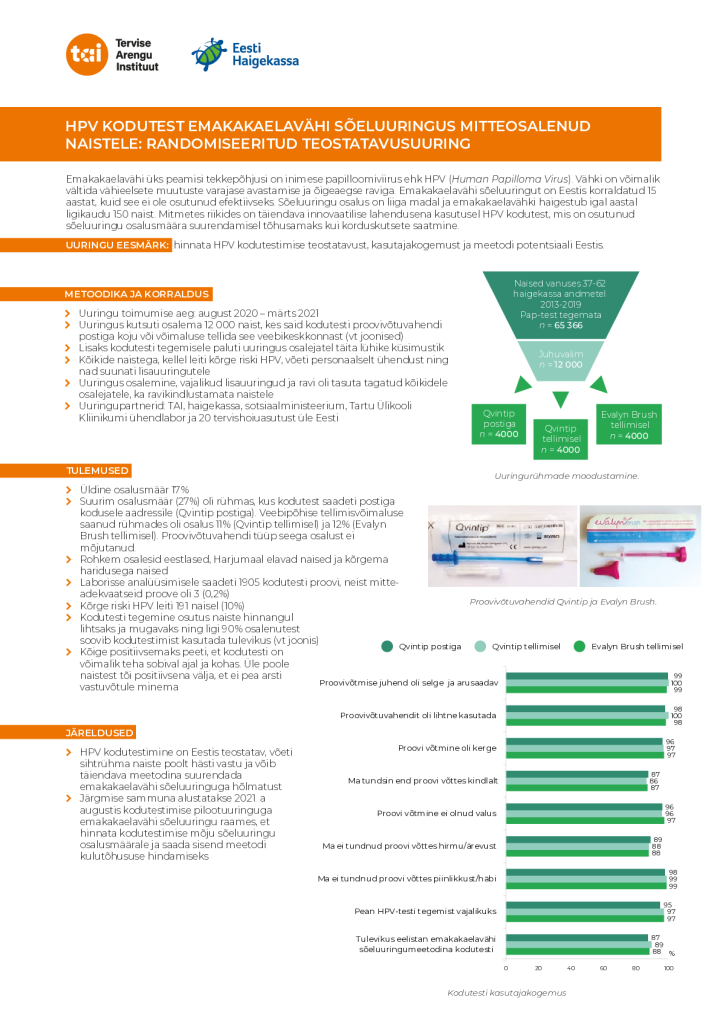Cancer research
Research plays a central role in the development, implementation and evaluation of national cancer control strategies. The growing number of cancer cases is a major burden on health systems and society.
The results of cancer research can be used to assess the effectiveness of cancer prevention, screening, early detection and treatment, and contribute to evidence-based policy and clinical decision-making. The results of research help to reduce cancer incidence and mortality, and increase the effectiveness of cancer treatment.
The studies mainly use data from the medical registries managed by the National Institute of Health Development, in particular the Cancer Screening Registry and the Cancer Registry, which are linked to other databases for additional data as needed.
Main studies
- Trends in cancer incidence, mortality, survival and prevalence in Estonia (2019–2030)
The objectives of the population-based cancer surveillance are: 1) to analyse trends in cancer incidence, mortality and prevalence and their long-term prediction in Estonia; 2) to assess trends in cancer outcomes and to analyse the impact of different factors on survival.Individual studies address different cancer sites.
- Optimizing cancer care and outcomes: a population-based real-world approach (2020–2024) (ETAG grant PRG722)
The overall goal of the project is to increase knowledge of the patterns and determinants of cancer in real-world settings and thereby optimize cancer care and outcomes. Read more about the research project on ETIS.
- Epidemiology of cancers in children, adolescents and young adults in Estonia: data quality, incidence and survival (2016–2025)
The aim of the study is to assess the quality of reporting of childhood and young adult cancers in the cancer registry, long-term morbidity and survival trends, and to prospectively collect clinical data on childhood cancers for the implementation of the Toronto stage in Estonia. The incidence of subsequent cancers in childhood cancer survivors will also be examined.
- Prostate cancer as a cause of death: a population-based data quality study (2020–2023)
The aim of the study is to assess the accuracy of prostate cancer mortality statistics in Estonia. The underlying cause of death as recorded in the Cause of Death Register is compared with the expert assessment based on medical records.
- We carry out specific studies on cervical cancer, more information on the Women's Health Studies page.
International cooperation
We contribute to international cancer research with Estonian data, participate in data analysis and publish research papers in collaboration with colleagues in other countries.
- Eurocare (European Cancer Registry Based Study on Survival and Care of Cancer Patients) is the largest and longest running collaborative project on cancer outcomes in Europe. The aim is to assess cancer outcomes in European countries in a regular manner. The results are published as scientific articles.
- RARECARENet. The pan-European RARECARENet project focuses on the assessment of morbidity and survival of rare cancers. Scientific articles are published as a result of the project.
- The European High-Resolution Study aims to identify the causes of variation in cancer outcomes in Europe using more detailed diagnosis, treatment and follow-up data, andcomparing them with conventional data from population-based cancer registries. Five malignancies are covered: breast, lung and colorectal cancer, skin melanoma and non-Hodgkin's lymphoma.
Scientific publications based on the EUROCARE High-Resolution study
- CONCORD. The CONCORD study aims to assess cancer outcomes worldwide using a standard methodology. Find out more on the CONCORD study website.
- VENUSCANCER. The global VENUSCANCER study aims to identify the causes of variation in cancer outcomes in women using detailed diagnosis and treatment data for breast, cervical and ovarian cancer. Find out more on the VENUSCANCER project website.
- BENCHISTA. The BENCHISTA International Childhood Cancer Study aims to assess the inequality in childhood cancer survival by stage and to implement the use of the Toronto stage in different countries, including Estonia. Find out more on the BENCHISTA study website.
- Nordscreen. We publish cancer screening data on the nordscreen.org platform. The Nordscreen web portal allows you to view and compare outcome and process indicators of population-based cancer screening programmes in the Nordic countries and Estonia.






